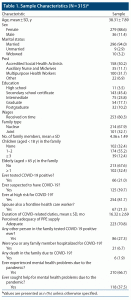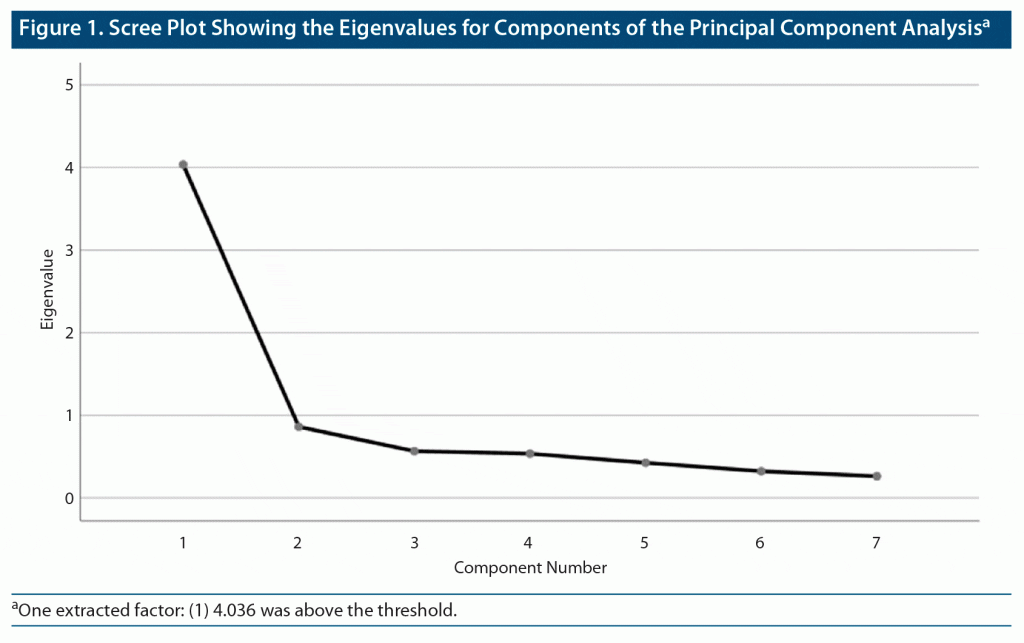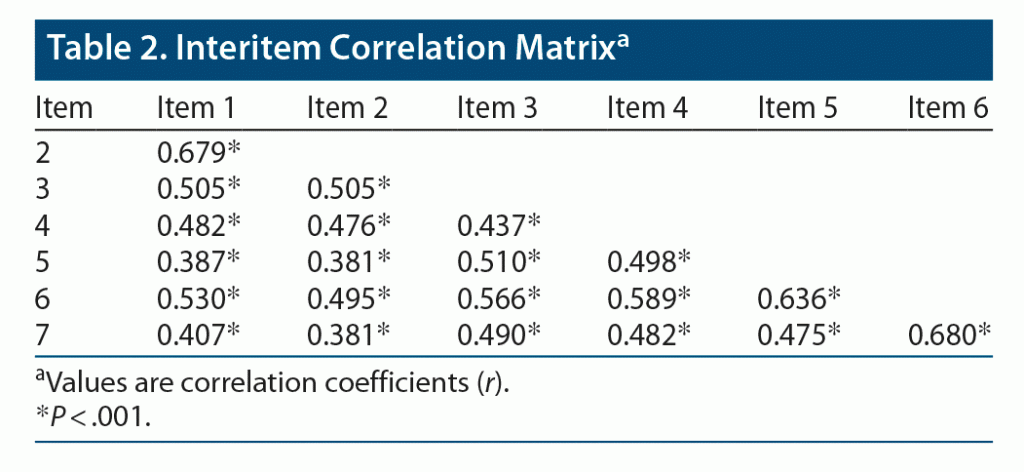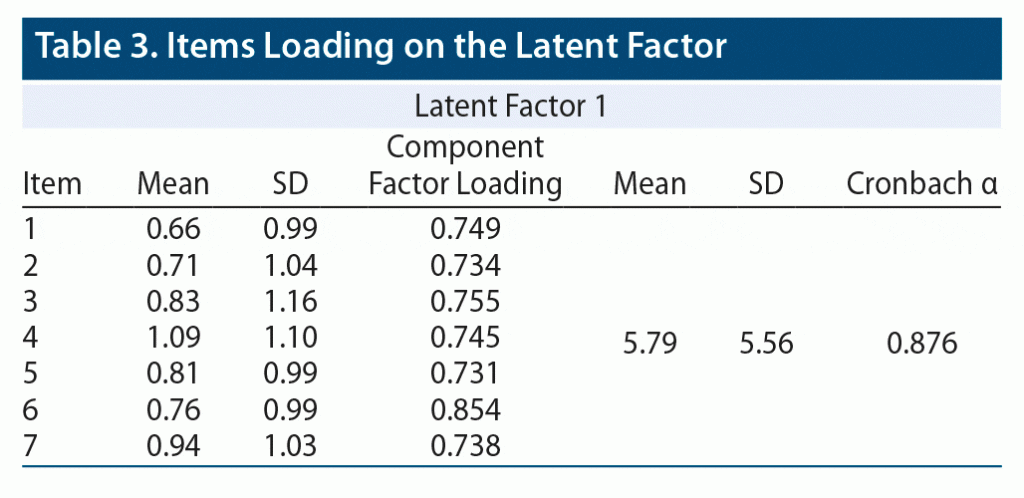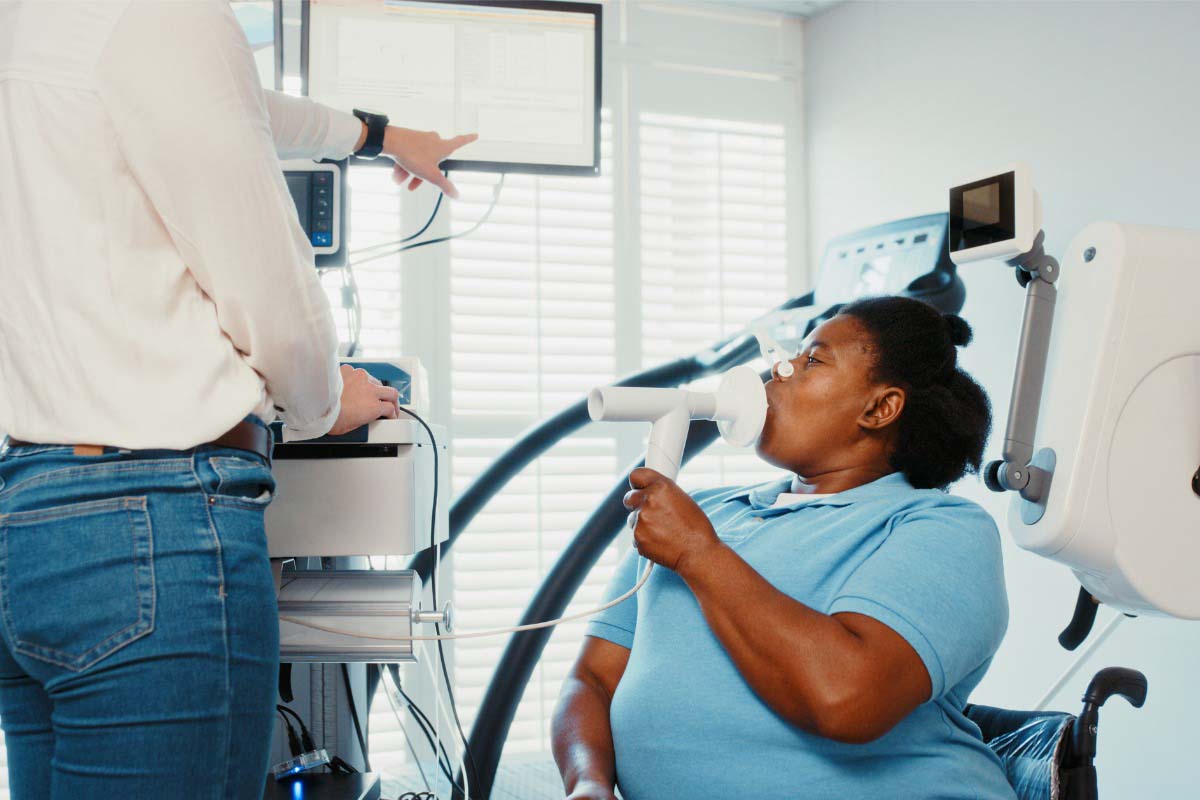ABSTRACT
Objective: Prevalence of insomnia has been high during the coronavirus disease 2019 pandemic, especially in health care workers. The 7-item Insomnia Severity Index (ISI) is the most commonly used tool to assess insomnia severity and its impact. The ISI has not been translated and validated for use among Telugu-speaking health care workers. The objective of this study was to explore the factor structure of the Telugu-translated version of the ISI, administered among primary care health workers in rural Telangana, India.
Methods: The Telugu version of the ISI was administered to 315 grass-root primary care health workers in rural primary health centers of 5 districts of Telangana. Exploratory factor analysis was conducted to measure the factor structure of the translated version of the ISI. Data were collected in August 2021.
Results: The principal component analysis showed that the 7 items of the scale significantly loaded on to 1 latent factor with an eigenvalue of 4.036, explaining 57.66% of the total variance. The factor reliability (Cronbach α) was 0.876.
Conclusions: The results show that the Telugu translated version of the ISI conforms to previously found factor solutions and is valid to assess insomnia severity in primary care health workers.
Prim Care Companion CNS Disord 2022;24(2):21m03185
To cite: Tikka SK, Malathesh BC, Sahoo DP, et al. Factor structure of the Telugu version of the Insomnia Severity Index administered to primary care health workers of rural Telangana during the COVID-19 pandemic. Prim Care Companion CNS Disord. 2022;24(2):21m03185.
To share: https://doi.org/10.4088/PCC.21m03185
© Copyright 2022 Physicians Postgraduate Press, Inc.
aDepartment of Psychiatry, All India Institute of Medical Sciences, Bibinagar, Hyderabad, India
bDepartment of Community and Family Medicine, All India Institute of Medical Sciences, Bibinagar, Hyderabad, India
cAll India Institute of Medical Sciences, Bibinagar, Hyderabad, India
*Corresponding author: Sai Krishna Tikka, MD, Department of Psychiatry, All India Institute of Medical Sciences, Bibinagar 508126, Hyderabad, India ([email protected]).
The coronavirus disease 2019 (COVID-19) pandemic has had a tremendous impact on people’s lives, affecting both physical and mental health. There has been a steep rise in the prevalence of psychological problems in the general population during the pandemic. Insomnia is prominent, with 30.3% of the population being affected.1 Health care workers may be at a higher risk of developing stress2–6 and insomnia due to the worry of getting infected and infecting their family members, overwhelming clinical workload due to increasing cases, fear of contagion, and insufficient protective equipment and limited treatment options. A recent meta-analysis7 found that the rate of insomnia in health care workers was 36.36%.
The total number of COVID cases in the 2 Telugu-speaking states of Andhra Pradesh and Telangana (ie, 2,742,000 [27.42 laks]) ranked fourth among the Indian states as of November 2, 2021. This caseload indicates an important need to assess insomnia severity in health care workers in this region, as caseload has been shown to be directly related to the mental health issues in these workers. The grass-root primary care health workers are placed at a higher risk of developing mental health issues due to underpayment and lack of compensation,8,9 apart from the burden of work and risk of infection. Therefore, validation of a local language translation of a tool to assess insomnia severity in the context of the pandemic is necessary to assess grass-root primary care health workers caring for COVID-19 patients in rural areas.
The Insomnia Severity Index (ISI) is the most commonly used tool to detect insomnia and assess self-perceived insomnia severity.7,10,11 The ISI assesses both insomnia severity and sleep impact. For the Indian population, only the Hindi version of the ISI has been validated.12 The objective of the current study was to translate the ISI to Telugu, a language spoken across the 2 southern Indian states of Telangana and Andhra Pradesh, and to assess its psychometric properties, specifically its factor structure.
METHODS
The data were collected as part of the United Nations Children’s Fund project titled “Mental Health of Frontline Healthcare Workers of Rural Telangana.” The study was approved by the institutional ethics committee (AIIMS/BBN/IEC/AUG/2021/98). The study involved translation (including assessment of interversion [English-Telugu] reliability) and assessment of structural validity (exploratory factor analysis) of the Telugu version of the ISI. Author permission for translation and validation of the ISI was sought.
The Insomnia Severity Index
The ISI is a 7-item self-report questionnaire that assesses the nature, severity, and impact of insomnia in the last month on a 5-point Likert scale. The 7 items of the questionnaire assess severity of sleep onset, sleep maintenance, early morning awakening problems, sleep dissatisfaction, interference of sleep difficulties with daytime functioning, noticeability of sleep problems by others, and distress caused by the sleep difficulties. The interpretation is based on the total score: 0–7 = absence of insomnia, 8–14 = subthreshold insomnia, 15–21 = moderate insomnia, and 22–28 = severe insomnia. Moderate and severe insomnia are together termed clinical insomnia.10
Translation
The initial translation was performed independently by 2 translation experts fluent in English and Telugu. Discrepancies were resolved through discussion between both the translators and one of the bilingually fluent study investigators (S.K.T.). The best translation was back translated to English by another bilingual mental health professional. All 3 translators and the bilingually fluent study investigator were then involved in serial identity checks until the linguistic equivalence was agreed upon.
Data Collection
Data were collected from a total of 323 grass-root primary care health workers who were involved in frontline COVID duties, consisting of the Accredited Social Health Activists, Multipurpose Health Workers, and Auxiliary Nurse and Midwives. The participants were working in 10 rural primary health centers of 5 districts (Yadadri Bhuvanagiri, Jayaprakash Bhupalapally, Medak, Vikarabad, and Janagaon) of Telangana. We aimed for a target sample of approximately 300 as per the customary “rule of thumb”13 of 300 samples for exploratory factor analysis. The number of participants from each primary health center was conveniently sampled and ranged between 24 and 36. Health care workers with a previously (pre-pandemic) diagnosed mental disorder were excluded. Written informed consent was taken from all the participants. Data were collected in August 2021. A uniform standard operating procedure for data collection was followed across the 10 primary health centers. The study tools, including the Telugu version of the ISI, were administered by a psychiatry faculty member, a psychiatric nurse, and a trainee resident. After excluding samples due to incomplete responses, data from 315 participants were used for analysis.
Pilot Testing
A group of 14 bilingual rural health care workers were administered both the English and the final Telugu versions for comprehensibility and interversion reliability.
Structural Validity
Exploratory factor analysis was conducted to determine the structural validity of the translated version of the ISI. Completed forms of the 7-item Telugu version of the ISI from 315 participants were analyzed. Analysis was conducted using the Statistical Package for Social Sciences version 23 (IBM Corporation, New York). Assumptions for the exploratory factor analysis were analyzed using the Kaiser-Meyer-Olkin (KMO) test (for sample size adequacy), the Bartlett test of sphericity (for interitem correlation significance), and the communality assessment (for strength of factor extraction). Factor extraction was conducted using the principal component analysis (PCA) and confirmed using the parallel analysis (https://analytics.gonzaga.edu/parallelengine/). As the PCA showed a 1-factor solution, no rotation was involved.
Factor Reliability
The items that correlated within the extracted factor were assessed for reliability using Cronbach α. Item deletion was planned if the factor reliability for any of the extracted factors was found to have a Cronbach α < 0.07. Pearson coefficient was calculated for correlations between the total scores and the scores on each of the extracted latent factors.
RESULTS
Sample Characteristics
Characteristics of the sample are described in Table 1.
Pilot Testing
No issues with comprehensibility were raised by the study participants. The Cronbach α coefficient for interversion correlation was 0.89.
Structural Validity
The mean ISI score for the participants was 5.79 (SD = 5.55, range, 0–27). The quartiles Q1, Q2, and Q3 were 2, 4, and 8, respectively. The proportion of participants with subthreshold, moderate, or severe insomnia was 22.2%, 5.4%, and 2.2%, respectively; 7.6% were considered to have clinical insomnia.
The assumptions for exploratory factor analysis were assessed and found to be satisfactory as follows:
- The sample size of 315 was sufficiently larger than the recommended sample size of 105 (ie, 15 participants per item [7 items]), almost reaching the customary rule of thumb of 300 samples.13 This sample size adequacy was further confirmed using the KMO test measure, which was found to be 0.870.
- Several correlations between each of the 7 items were found to be statistically significant (P < .001) (Table 2). The Bartlett test of sphericity was also found to be statistically significant (χ2 = 1024.06, P < .001).
- The strength of extraction (ie, communality) for all the items was found to be > .5.
The PCA showed that the eigenvalues were > 1 for 1 extracted factor (4.036); Figure 1 provides the Scree plot. The factor accounted for 57.66% of the total variance. The PCA calculated eigenvalue for the factor was greater than the mean eigenvalue of the factor in the parallel analysis (1.207). The second factor’s calculated eigenvalue (0.860) was smaller than the mean eigenvalue of the second factor (1.127) in the parallel analysis. The component factor loadings for each of the 7 items of the ISI along with means and SDs for each item total score are shown in Table 3.
Factor Reliability
The factor reliability for the extracted factor was found to be good (Cronbach α = 0.876).
DISCUSSION
Assessment for insomnia, depression, anxiety, and perceived stress is considered a crucial aspect of the overall psychosocial care of frontline health care workers in India.14 The most commonly used assessment tool for the assessment of insomnia is the ISI.15 The ISI has acceptable psychometric properties when administered in the Indian population using a Hindi-adapted version.12 The English version of the ISI has been used to assess rates of insomnia in Indian populations.16,17
Our study found that the Telugu version of the ISI has a single factor solution and is valid for administration to grass-root primary care health workers. A recent meta-analysis18 on the structural validity of the ISI showed that 3 types of dimensionality (ie, 1-factor, 2-factor, and 3-factor) and 13 models of dimensionality have been observed. While the majority of studies have found a 2-factor solution with the 2 latent factors being “severity” and “impact,” 4 studies have shown a 1-factor solution for the ISI,19–22 which is similar to our study results. While the English version used to assess insomnia in war veterans with traumatic brain injury found a 1-factor solution,19 the other 3 studies used German,20 Swedish,21 and Arabic22 versions of the ISI. These results indicate that ISI item scores of grass-root primary care health workers denote a single dimension and may not be interpreted as severity, impact, or type of insomnia.
The rate of clinical insomnia in grass-root primary care health workers in the current study was 7.6%. This rate is lower than the reported global rates7 (ie, approximately 36%). It has been observed that the rates of insomnia in southeast Asia (19%),23 especially in India (15.2%),16 have been lower than the global rates. The rates found in our study may be lower because the data were collected during the pandemic phase when the caseload was very low. However, rates of 7.6% for clinical insomnia and 22.2% for subthreshold insomnia during the aftermath of the severe second wave of the COVID-19 pandemic in India suggest that there is a need to address these problems.
Strengths and Limitations
An adequate sample size for the exploratory factor analysis is an inherent strength of our study. The interviews for data collection being face to face, rather than an online assessment as in most studies,16,17 which has questionable validity,24 is also deemed an important strength of our study.
The 2-factor solution, compared to the 1-factor solution used in our study, has been considered a more “vigorous presentation” of ISI dimensionality. A previous study25 has shown that 2 language versions of the ISI may show different factor solutions in the same population. While a 2-factor solution was found for the English version, a 3-factor solution was shown for the French version of the ISI in a single sample of Lebanese adoloscents.25 Lack of an adequate sample to form 2 subsets to conduct exploratory and confirmatory factor analysis is a limitation of our study. As the sample was restricted to only health care workers, the generalizability of the psychometric characteristics, including the dimensionality, of the Telugu version of the ISI should be examined among other subsamples and the general population at large.
CONCLUSION
The Telugu version of the ISI has single dimensionality and is valid for administration. Although our study findings conform to previously found factor solutions, conducting a multimodel confirmatory factor analysis in a separate sample may be necessary to account for the less common 1-factor dimensionality found in this study.
Submitted: November 3, 2021; accepted December 28, 2021.
Published online: March 22, 2022.
Relevant financial relationships: None.
Funding/support: The study was funded by the United Nations Children’s Fund.
Role of the sponsor: The sponsor was involved in the review of the project proposal (conceptualization of the design and methods) and the final project report. The sponsor had no direct role in the conduct of the study including data collection, management, analysis and interpretation of data, and manuscript submission.
Acknowledgments: The authors thank all the medical officers of the selected 10 primary health centers for their support during the data collection. They also thank Naomi Lyngdoh, BSc (nursing officer, Department of Psychiatry, AIIMS, Hyderabad) and Yangyasani Patra, MA (Accounts Department, AIIMS, Hyderabad) for help with the logistics and data entry/collation and Bhau Singh, MA (Academic section, AIIMS, Hyderabad); Siva Prasad, PhD (independent researcher, Hyderabad); and Ravali Reddy, MBBS (junior resident, Department of Dermatology, AIIMS, Hyderabad) for their support in the translation process. None of the acknowledged individuals report conflicts of interest related to the subject of this article.
Clinical Points
- Use of the Telugu translated version of the 7-item Insomnia Severity Index for assessment of insomnia in grass-root primary care health workers of Telangana is suggested.
- During the COVID-19 pandemic, clinical insomnia is common among primary care health workers even when the COVID caseload is lower.
References (25)

- Liu X, Zhu M, Zhang R, et al. Public mental health problems during COVID-19 pandemic: a large-scale meta-analysis of the evidence. Transl Psychiatry. 2021;11(1):384. PubMed CrossRef
- Chua GT, Tung KTS, Kwan MYW, et al. Multilevel factors affecting healthcare workers’ perceived stress and risk of infection during COVID-19 pandemic. Int J Public Health. 2021;66:599408. PubMed CrossRef
- Deressa W, Worku A, Abebe W, et al. Risk perceptions and preventive practices of COVID-19 among healthcare professionals in public hospitals in Addis Ababa, Ethiopia. PLoS One. 2021;16(6):e0242471. PubMed CrossRef
- Rose S, Hartnett J, Pillai S. Healthcare worker’s emotions, perceived stressors and coping mechanisms during the COVID-19 pandemic. PLoS One. 2021;16(7):e0254252. PubMed CrossRef
- Teshome A, Shegaze M, Glagn M, et al. Perceived stress and associated factors among health care professionals working in the context of COVID-19 pandemic in public health institutions of southern Ethiopia 2020. PLoS One. 2021;16(6):e0252809. PubMed CrossRef
- Bauddh NK, Sharda M, Shyoran S, et al. Perceived stress among healthcare workers in COVID-19 pandemic. J Assoc Physicians India. 2021;69(8):11–12. PubMed
- Sahebi A, Abdi K, Moayedi S, et al. The prevalence of insomnia among health care workers amid the COVID-19 pandemic: an umbrella review of meta-analyses. J Psychosom Res. 2021;149:110597. PubMed CrossRef
- Overworked, underpaid: Asha workers, the frontline warriors in rural UP's COVID battle. India Today website. Accessed February 10, 2022. https://www.indiatoday.in/coronavirus-outbreak/story/uttar-pradesh-rural-corona-asha-anganwadi-anm-nurses-underpaid-1802310-2021-05-13
- Riding on hope. Hindu BusinessLine website. Accessed February 10, 2022. https://www.thehindubusinessline.com/blink/cover/asha-workers-in-india-await-recognition-and-compensation-for-battling-covid19-on-the-ground/article33988456.ece
- Morin CM, Belleville G, Bélanger L, et al. The Insomnia Severity Index: psychometric indicators to detect insomnia cases and evaluate treatment response. Sleep (Basel). 2011;34(5):601–608. PubMed CrossRef
- Gu NY, Botteman MF, Ji X, et al. Mapping of the Insomnia Severity Index and other sleep measures to EuroQol EQ-5D health state utilities. Health Qual Life Outcomes. 2011;9(1):119. PubMed CrossRef
- Lahan V, Gupta R. Translation and validation of the Insomnia Severity Index in Hindi language. Indian J Psychol Med. 2011;33(2):172–176. PubMed CrossRef
- Tabachnick BG, Fidell LS. Using Multivariate Statistics. 3rd ed. New York: HarperCollins; 1996.
- Janardhana N, Joseph SJ, Kanmani TR, et al. Psychosocial care for frontline health care workers: an information manual. NIMHANS, Bengaluru website. Accessed February 10, 2022. https://nimhans.ac.in/wp-content/uploads/2021/04/FHW-Manual-Final.pdf
- Morin CM. Insomnia: Psychological Assessment and Management. New York: Guilford Press; 1993.
- Lahiri A, Jha SS, Acharya R, et al. Correlates of insomnia among the adults during COVID19 pandemic: evidence from an online survey in India. Sleep Med. 2021;77:66–73. PubMed CrossRef
- Gupta R, Grover S, Basu A, et al. Changes in sleep pattern and sleep quality during COVID-19 lockdown. Indian J Psychiatry. 2020;62(4):370–378. PubMed CrossRef
- Manzar MD, Jahrami HA, Bahammam AS. Structural validity of the Insomnia Severity Index: a systematic review and meta-analysis. Sleep Med Rev. 2021;60:101531. PubMed CrossRef
- Kaufmann CN, Orff HJ, Moore RC, et al. Psychometric characteristics of the Insomnia Severity Index in veterans with history of traumatic brain injury. Behav Sleep Med. 2019;17(1):12–18. PubMed CrossRef
- Gerber M, Lang C, Lemola S, et al. Validation of the German version of the Insomnia Severity Index in adolescents, young adults and adult workers: results from three cross-sectional studies. BMC Psychiatry. 2016;16(1):174. PubMed CrossRef
- Dragioti E, Wiklund T, Alföldi P, et al. The Swedish version of the Insomnia Severity Index: factor structure analysis and psychometric properties in chronic pain patients. Scand J Pain. 2015;9(1):22–27. PubMed CrossRef
- Ahmed AE. Validation of Arabic versions of three sleep surveys. Qatar Med J. 2014;2014(2):130–136. PubMed
- Pappa S, Chen J, Barnett J, et al. A systematic review and meta-analysis of the mental health symptoms during the COVID-19 pandemic in Southeast Asia [published online ahead of print October 26, 2021]. Psychiatry Clin Neurosci. doi: 10.1111/pcn.13306. 2021;pcn.13306. PubMed CrossRef
- Sharma R, Tikka SK, Bhute AR, et al. Adherence of online surveys on mental health during the early part of the COVID-19 outbreak to standard reporting guidelines: a systematic review. Asian J Psychiatr. 2021;65:102799. PubMed CrossRef
- Chahoud M, Chahine R, Salameh P, et al. Reliability, factor analysis and internal consistency calculation of the Insomnia Severity Index (ISI) in French and in English among Lebanese adolescents. eNeurologicalSci. 2017;7:9–14. PubMed CrossRef
Enjoy this premium PDF as part of your membership benefits!
